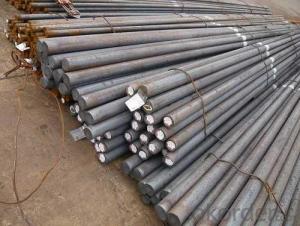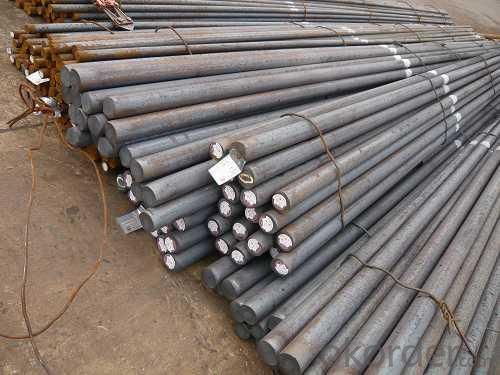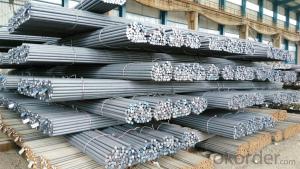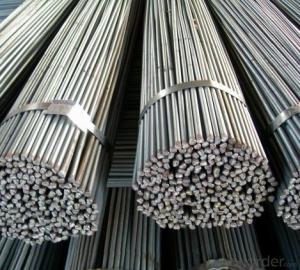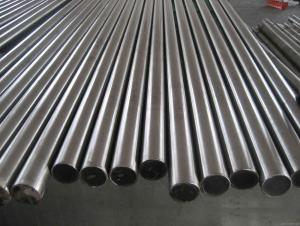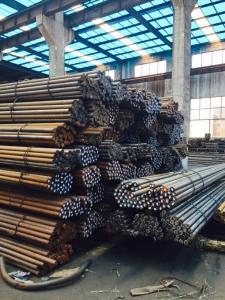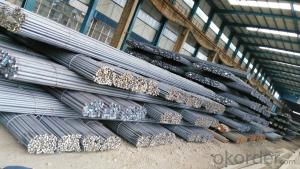Round Bar with the Best Price Carbon Steel Round Bars 16MM-80MM
- Loading Port:
- Tianjin
- Payment Terms:
- TT or LC
- Min Order Qty:
- 27 m.t.
- Supply Capability:
- 25000 m.t./month
OKorder Service Pledge
OKorder Financial Service
You Might Also Like
Product Description of Round Bar with the Best Price Carbon Steel Round Bars 16MM-80MM:
1. Material: Alloy structural steels, carbon structure steels, alloy tool and model steels,etc.
2. Process: EAF + LF + VD + Forged + Heat Treatment (optional)
3. Delivery condition:Hot forged +Rough machined (black surface after Q/T)+ Turned (optional)
4.Technical Data: Chemical Composition, Physical Properties and Mechanical Testing.
5.Test: Ultrasonic test according to SEP 1921-84 3C/c.
Chemical Composition of Round Bar with the Best Price Carbon Steel Round Bars 16MM-80MM:
C | Si | Mn | P | S | Cr | |
45Cr | 0.42-0.49 | 0.17-0.37 | 0.6-0.9 | Max0.035 | Max0.035 | 0.3 0.4 |
S45C | 0.42-0.48 | 0.15-0.35 | 0.6-0.9 | Max0.030 | Max0.035 | |
1045 | 0.43-0.5 | 0.15-0.35 | 0.6-0.9 | Max0.030 | Max0.050 |
Application of Round Bar with the Best Price Carbon Steel Round Bars 16MM-80MM:
1 Can be used in many fields such as building, automobile, shipbuilding,
petrochemical, machinery, medicine, food, electric power, energy, space, building
and decoration, etc.
2 Can be made into mould template, mortise pin, column
3 This kind of steel have good mechanical property, is widely used in structural parts
4 which may support stress alternation, especially made into some connecting
rods, bolts, wheel gear...
5 This kind of steel is the most common blanks and materials of shaft part
Pictures of Round Bar with the Best Price Carbon Steel Round Bars 16MM-80MM:
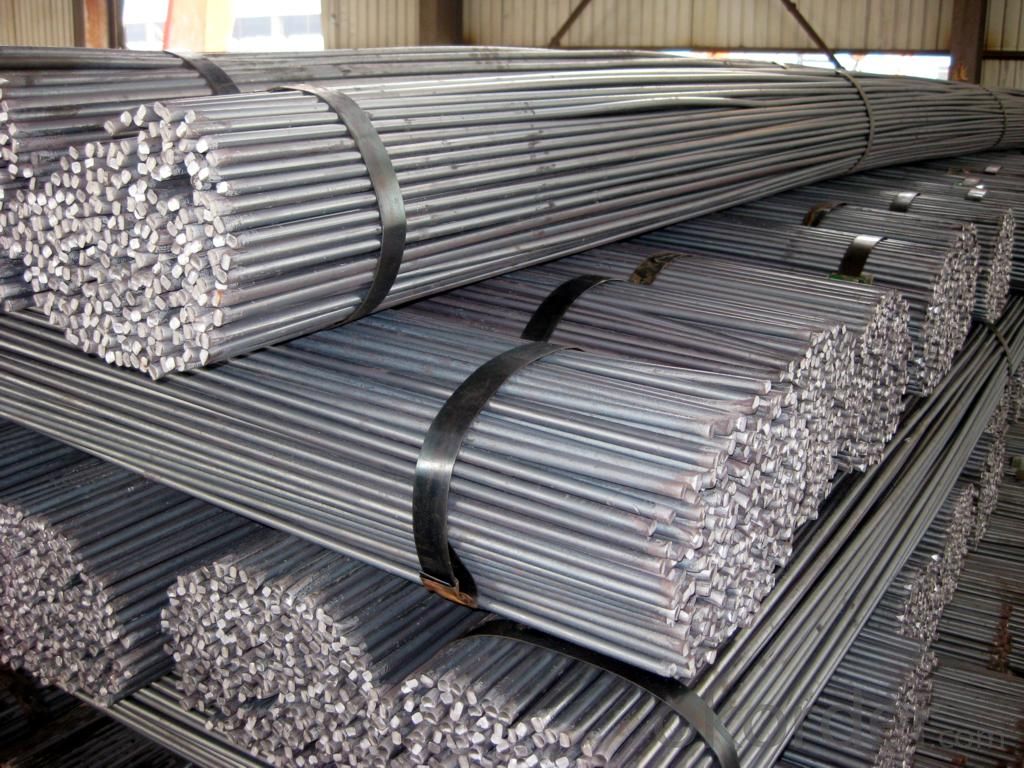
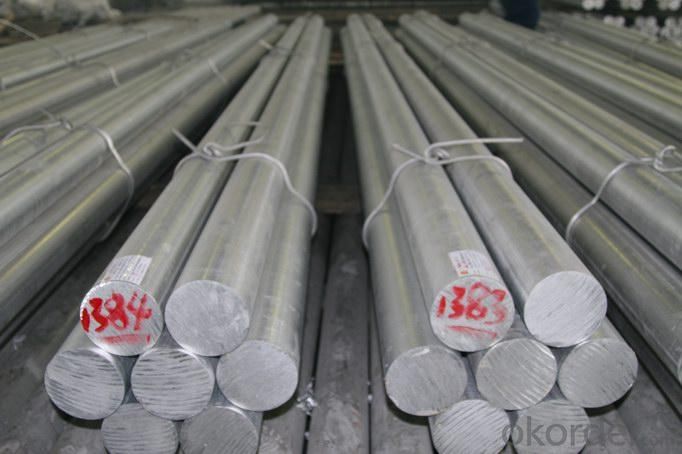
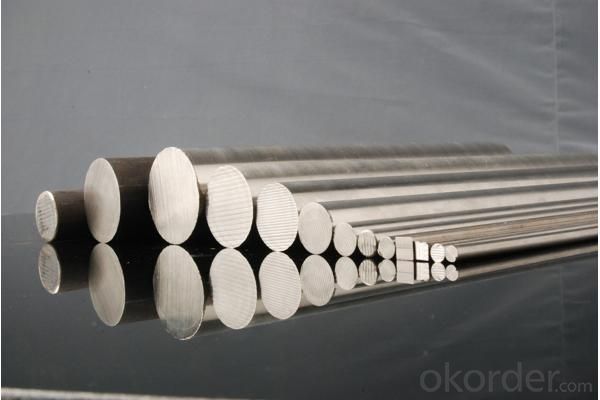
- Q: Can steel round bars be used in food processing applications?
- No, steel round bars are not suitable for food processing applications as they can corrode and contaminate the food. Stainless steel is typically used in such applications due to its corrosion resistance and hygienic properties.
- Q: What are the different mechanical properties of steel round bars?
- The different mechanical properties of steel round bars include tensile strength, yield strength, elongation, hardness, and impact resistance. Tensile strength refers to the maximum amount of stress a material can withstand before breaking. Yield strength is the stress at which a material begins to deform permanently. Elongation measures the amount of deformation a material can undergo before breaking. Hardness determines the material's resistance to indentation or scratching. Impact resistance is the ability of a material to absorb energy during sudden impacts without breaking.
- Q: Can steel round bars be used in the renewable energy industry?
- Yes, steel round bars can be used in the renewable energy industry. Steel round bars are versatile and durable, making them suitable for various applications in renewable energy projects. For example, they can be used as support structures for solar panels, wind turbine towers, and hydroelectric power plants. Steel round bars provide the necessary strength and stability to withstand the harsh environmental conditions often associated with renewable energy projects. Additionally, steel is a highly recyclable material, aligning with the sustainable principles of the renewable energy industry. Therefore, steel round bars are a viable and commonly used component in the construction and development of renewable energy infrastructure.
- Q: What are the advantages of using steel round bars over other materials?
- Steel round bars have numerous advantages compared to other materials: 1. Strength and durability: Known for their remarkable strength and durability, steel round bars are perfect for a wide range of applications. They can withstand heavy loads and resist deformation, making them ideal for structural purposes. 2. Versatility: Steel round bars offer tremendous versatility due to their various sizes, grades, and finishes. They can be easily customized to meet specific requirements, such as different lengths, diameters, and surface finishes. 3. Cost-effectiveness: Steel round bars provide a cost-effective solution when compared to other materials. They are readily available and affordable, thanks to their abundance and efficient manufacturing processes. Moreover, their high strength-to-weight ratio allows for the use of smaller quantities of steel without compromising strength. 4. Corrosion resistance: Steel round bars can be produced with different finishes, including galvanized or stainless steel, which enhances their resistance to corrosion. This enables them to be suitable for outdoor applications or environments where they may encounter moisture or chemicals. 5. Machinability: Steel round bars are highly regarded for their excellent machinability, allowing for easy cutting, drilling, or shaping according to specific design requirements. This characteristic promotes efficient processing and reduces production costs. 6. Fire resistance: Steel is inherently fire-resistant and does not contribute to the spread of flames. Consequently, steel round bars are the preferred choice in applications where fire safety is a concern, such as construction or industrial settings. 7. Recyclability: Steel is highly recyclable, making steel round bars an environmentally friendly option. They can be easily melted down and reused to create new steel products without compromising their properties or strength. In summary, the advantages of using steel round bars over other materials include their strength, durability, versatility, cost-effectiveness, corrosion resistance, machinability, fire resistance, and recyclability. These factors make steel round bars the preferred choice in various industries, including construction, manufacturing, automotive, and infrastructure projects.
- Q: What are the different tolerances for steel round bars?
- There are various tolerances for steel round bars, depending on the specific requirements and standards set by different industries and applications. These tolerances ensure that the dimensions and surface conditions of the steel round bars meet the desired specifications. The most common tolerance for steel round bars is the diameter tolerance. This refers to the allowable deviation from the specified diameter. For example, a steel round bar with a diameter tolerance of +/- 0.005 inches means that the actual diameter of the bar can vary within this range. Another important tolerance for steel round bars is the straightness tolerance. This refers to the allowable deviation from a straight line over a specified length of the bar. Straightness tolerances are usually given in terms of the maximum deviation in relation to the length, such as 0.010 inches per foot. Surface finish tolerance is also crucial for steel round bars. It refers to the acceptable variation in the surface texture or roughness of the bar. This tolerance is often specified using parameters such as Ra (average roughness) or Rz (maximum roughness depth). For example, a surface finish tolerance of Ra 0.8 micrometers means that the average roughness of the bar's surface should not exceed this value. In addition to these common tolerances, there may be other specific tolerances based on the intended application of the steel round bars. These can include tolerances for straightness, length, weight, or other dimensional properties. It is important to note that the tolerances for steel round bars can vary depending on the standards followed by different industries and countries. It is always recommended to refer to the relevant standards or specifications to determine the specific tolerances required for a particular application.
- Q: What are the advantages of using aluminum-silicon alloy steel round bars?
- Aluminum-silicon alloy steel round bars offer numerous benefits: 1. Enhanced lightweight: By combining aluminum with silicon, the round bars become even lighter, making them easier to handle. This is especially advantageous in industries where weight reduction is crucial, like aerospace and automotive. 2. Exceptional strength: The mechanical properties of aluminum-silicon alloy steel round bars, such as high tensile and good yield strength, allow them to withstand heavy loads and provide structural integrity in various applications. 3. Resistance to corrosion: These round bars exhibit excellent resistance to corrosion, making them suitable for environments with moisture or chemicals. Thus, they can be used in applications exposed to harsh conditions or corrosive substances. 4. Efficient thermal conductivity: The round bars' excellent thermal conductivity facilitates efficient heat transfer. This property is particularly beneficial in industries like heat exchangers, where effective thermal management is essential. 5. Easy machinability: Aluminum-silicon alloy steel round bars are relatively easy to machine, allowing for precise shaping and forming. This makes them ideal for applications requiring intricate designs or specific dimensions. 6. Cost-effective solution: Compared to other materials, aluminum-silicon alloy steel round bars offer a cost-effective solution due to their low production and maintenance costs. This makes them popular in construction, automotive, and manufacturing industries. 7. Environmentally friendly: Aluminum-silicon alloy steel round bars are highly recyclable, which is crucial in today's environmentally conscious world. Recycling these alloys requires less energy compared to primary production, making them a sustainable choice. In conclusion, the advantages of aluminum-silicon alloy steel round bars encompass their lightweight nature, high strength, corrosion resistance, thermal conductivity, machinability, cost-effectiveness, and recyclability. These properties make them a versatile material for a wide range of applications across various industries.
- Q: How are steel round bars used in the manufacturing of lifting equipment?
- Due to their strength, durability, and versatility, steel round bars are commonly used in the manufacturing of lifting equipment. These bars are typically made from high-quality steel alloys like carbon steel or alloy steel, which provide the necessary strength and toughness for lifting heavy loads. In the manufacturing process, steel round bars serve as the main structural component of lifting equipment such as cranes, hoists, and lifting hooks. They are utilized to create the frame and support structures that ensure stability and load-bearing capacity. Moreover, steel round bars are employed to fabricate various lifting components like shafts, axles, and pins. These components play a crucial role in the proper functioning of lifting equipment and are designed to withstand high levels of stress and strain. The use of steel round bars guarantees that they can handle heavy loads without deforming or failing. Additionally, steel round bars are frequently used to manufacture lifting hooks and chains. Lifting hooks are essential for attaching the load to the lifting equipment, while chains secure and lift the load. Steel round bars provide the necessary strength and rigidity to handle the weight of the load, ensuring safe and efficient lifting operations. Furthermore, manufacturers can machine, forge, or heat-treat steel round bars to achieve specific mechanical properties required for lifting equipment manufacturing. This flexibility allows manufacturers to customize the bars to meet the specific requirements of different lifting applications, such as withstanding high temperatures or resisting corrosion. In conclusion, steel round bars are indispensable in the manufacturing of lifting equipment. Their strength, durability, and versatility make them ideal for creating the structural frames, support structures, and lifting components necessary for safe and efficient lifting operations.
- Q: How are steel round bars used in the manufacturing of hydraulic systems?
- Due to their strength, durability, and versatility, steel round bars are widely used in the manufacturing of hydraulic systems. These bars serve multiple purposes in the construction and assembly of hydraulic components. One primary application of steel round bars in hydraulic systems is for fabricating piston rods. Piston rods are crucial components of hydraulic cylinders that transfer the force generated by the hydraulic fluid to the desired mechanism. The high strength and rigidity of steel round bars make them ideal for this purpose, as they can withstand the intense pressure and stress exerted on the piston rod during operation. Steel round bars are also utilized in manufacturing shafts and axles within hydraulic systems. These components transmit rotational motion and torque from the hydraulic pump to other mechanical parts, such as gears or pulleys. By using steel round bars, manufacturers can ensure the reliability and longevity of these critical parts, as they possess excellent mechanical properties and resistance to wear and tear. Moreover, steel round bars are often employed in constructing hydraulic fittings and connectors. These components join different hydraulic pipes, hoses, or valves together, creating a sealed system for fluid transmission. Steel round bars provide the necessary strength and stability to withstand the high-pressure conditions within hydraulic systems, ensuring leak-free operation and efficient fluid transfer. In conclusion, steel round bars play a vital role in the manufacturing of hydraulic systems by providing strength, durability, and versatility. Their use in piston rods, shafts, axles, fittings, and connectors ensures the proper functioning and reliability of these systems.
- Q: Can steel round bars be used for making gates?
- Indeed, gates can be made using steel round bars. The strength, durability, and versatility of steel round bars make them a favored option for gate production. Welding them together to achieve the desired gate design is a simple task, and they possess the capacity to endure substantial loads and impacts. Furthermore, steel round bars can undergo galvanization or coating processes in order to safeguard them against rust and corrosion, enhancing the gate's longevity. As a result, steel round bars are an appropriate material for constructing gates and are frequently employed in residential, commercial, and industrial settings.
- Q: What are the different surface treatments for steel round bars?
- There are several different surface treatments available for steel round bars, each serving a specific purpose and providing unique benefits. Some of the most common surface treatments for steel round bars include: 1. Hot-dip galvanizing: This process involves immersing the steel round bars in a bath of molten zinc, which creates a protective coating that helps prevent corrosion and rusting. Hot-dip galvanizing is an effective treatment for steel round bars used in outdoor or corrosive environments. 2. Painting: Applying a coat of paint to the surface of steel round bars not only enhances their appearance but also provides a protective barrier against moisture and oxidation. Painting is commonly used for decorative purposes or when a specific color is desired. 3. Powder coating: Powder coating involves applying a dry powder to the steel round bars, which is then cured under heat to form a durable and attractive finish. This treatment offers excellent resistance to impact, chemicals, and UV rays, making it suitable for various applications. 4. Electropolishing: This process uses an electric current and an electrolyte solution to remove a thin layer of the steel round bars' surface, resulting in a smooth and shiny finish. Electropolishing improves the appearance and corrosion resistance of the steel, making it ideal for applications that require a high level of cleanliness and aesthetics. 5. Passivation: Passivation involves treating the steel round bars with an acid solution to remove any free iron or iron oxide from the surface, thus enhancing their corrosion resistance. Passivation is commonly used for stainless steel round bars to increase their longevity and prevent staining or rusting. 6. Shot blasting: Shot blasting is a mechanical surface treatment that involves bombarding the steel round bars with small steel balls or particles at high velocity. This process removes any surface contaminants, scale, or rust, resulting in a clean and roughened surface that improves adhesion for subsequent coatings or treatments. 7. Chrome plating: Chrome plating is a technique where a thin layer of chromium is electroplated onto the surface of steel round bars. This treatment provides excellent corrosion resistance, wear resistance, and a shiny appearance, making it suitable for applications that require durability and aesthetics. Overall, the choice of surface treatment for steel round bars depends on the specific requirements of the application, such as corrosion resistance, aesthetics, or wear resistance. It is important to carefully consider the intended use and environmental conditions before selecting the most appropriate surface treatment for steel round bars.
Send your message to us
Round Bar with the Best Price Carbon Steel Round Bars 16MM-80MM
- Loading Port:
- Tianjin
- Payment Terms:
- TT or LC
- Min Order Qty:
- 27 m.t.
- Supply Capability:
- 25000 m.t./month
OKorder Service Pledge
OKorder Financial Service
Similar products
Hot products
Hot Searches
